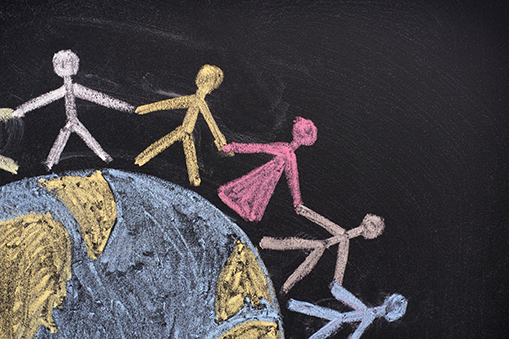The environment is one of three key drivers for education for the future identified on our Masters in Education (Learning and Teaching) qualification as urgently needing our attention as educators. In our Badged course Looking Globally: The Future of Education, in relation to an environmental issue affecting where you live, learners are asked:
- In response to the key environmental issue(s) you have identified locally, how could your local education system respond?
- How might you expect your local education system to respond given your awareness of constraints on it?
- How can local education systems respond to the wider, global environmental challenges?
- How do your responses to these questions connect with any of the three models for education introduced in week 2 of the course?
 So, what can we do? What do students on our courses, many of whom are teachers, do in response to being challenged to act in response to the environment? What do you expect teachers to do?
So, what can we do? What do students on our courses, many of whom are teachers, do in response to being challenged to act in response to the environment? What do you expect teachers to do?
18 students on EE830 Education for the next generation (Anita Bjelke, Susannah Burrell, Elizabeth Edwards, Ross Griffin, Sofia Idrissi, Charlotte Jukes, Anne Kagoya, Sarah Kemsley, Karen Maddison, Jo McMullen, Llinos Nelson, James Nevin, Manka Rangar, Damian Rayner, Chris Saunders, Melanie Tickle, Emma Wilkinson, Ibrahim I. Yahaya), themselves teachers, came together to analyse their course reflections on how education needed to respond to the environment. They presented their analysis at an international conference and then as a book chapter (Fox et al., 2019). They showed how they could apply frameworks for thinking about Education for Sustainable Development (ESD), originally written for Higher Education settings paper (Warwick, 2016; Winter et al., 2015), to a wide range of their own school-age settings. The consensus was:
- EfS needs to become part of an intended ‘hidden’ curriculum, not a bolt-on
- EfS should be integrated into all aspects of the curriculum.
- EfS can be realised through the way we teach (pedagogy) and curriculum.
Teachers on the module evidenced how they had changed their practice as a result of focusing on these issues but also reported that, even as enthusiastic environmental champions, this was insufficient.
- Critical study of the issues, such as through Masters study, is only the start; activism is what is needed.
- They needed support from leadership across education as a sector and society more generally to help overcome feelings of powerlessness, futility, or limited gains from their actions.
- This requires EfS to be on the political agenda and to be valued by the commercial sector as part of the solution going forwards.
In the run-up to World Environment Day 2021, two further students on the same module evaluated the impact of studying EfS on their vision and practice. Jonathan Harris applied this to his work in primary schools, in particular the Music curriculum, and James Mansell to his work in secondary school Physical Education (PE). They too realised the necessity of placing EfS at the core of curriculum, pedagogy, and assessment - not only to benefit the lives of the students they teach, but also the communities in which those children and young people reside.
Not only did they post on the School’s Research Conversations: by and for Education researchers blog about how their views were set in much wider research internationally, but they also posted examples of their own practice change in personal blogs, something encouraged on the Masters in Education as a space for airing development and new understanding. See Jonathan’s blog post highlighting the importance of community links and wider skill development at: Integrating Education for Sustainable Development into Music Education and James’ post highlighting a need for diversity as an important element of sustainability at: Implementing Education for Sustainable Development in Physical Education in England

Rate and Review
Rate this article
Review this article
Log into OpenLearn to leave reviews and join in the conversation.
Article reviews